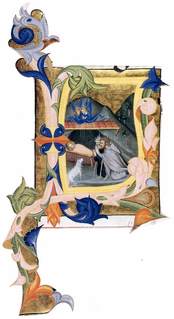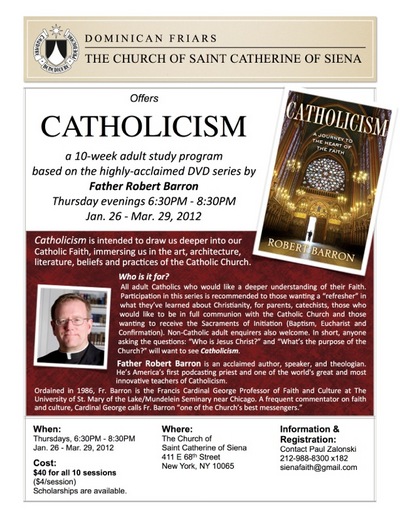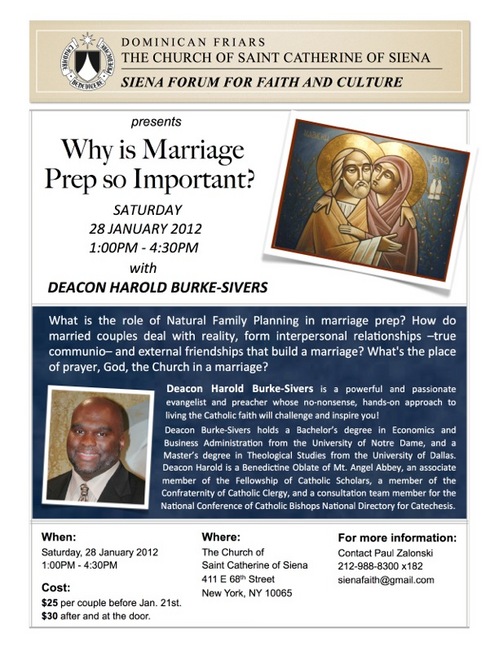Paul Zalonski: December 2011 Archives
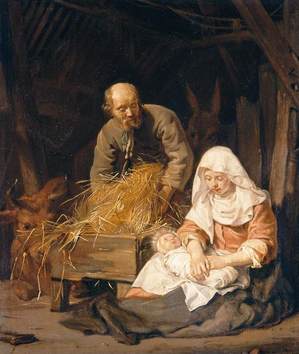
O
God, who were pleased to give us the shining example of the Holy Family,
graciously grant that we may imitate them in practicing the virtues of family
life and in the bonds of charity, and so, in the joy of your house, delight one
day in eternal rewards.
Today is a fitting day to follow the Fourth Commandment: Honor your father and mother. Of course, this applies to our living and deceased parents.
The consistent teaching of the Church, based on sacred Scripture and Tradition, tells us that the family is an irreplaceable contribution to the good of society. In an eminent
way the family, through responsible motherhood and fatherhood, and the spouses' unique and singular participation in God's work of co-creation. Pope Benedict XVI reminds that us that "the
natural family, as an intimate of life and love, based on marriage between a
man and a woman, constitutes 'the primary place of humanization for the person
and society,' and 'a cradle of life and love'" (Message for the Celebration
of the World Day of Peace 2008).
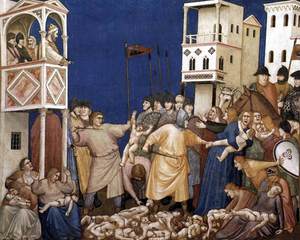
At the king's command these innocent babes and little Children were put to death. They died for Christ, and now in the glory of heaven as they follow Him, the spotless Lamb, they sing for ever: Glory to You, O Lord!
O God, whom the Holy Innocents confessed and proclaimed on this day, not speaking but by dying, grant we pray, that the faith in you which we confess with our lips may also speak through our manner of living.
Pay close attention to the sentiments of this prayer: confession of the reality of God not by words but by actions, by the way we live. How appropriate to keep this in mind these days.
 Today, the Church celebrates the liturgical memorial of the Beloved disciple, Saint John the Evangelist. As you know, John is the great theologian, perhaps you might say after Saint Paul, of Jesus. His Gospel is a superb love story.
Today, the Church celebrates the liturgical memorial of the Beloved disciple, Saint John the Evangelist. As you know, John is the great theologian, perhaps you might say after Saint Paul, of Jesus. His Gospel is a superb love story.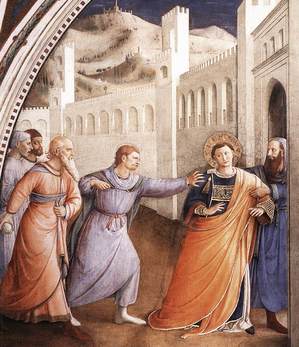
 Father Steve Rossetti, a priest of the Diocese of Syracuse (NY) and a professor of Theology at the Catholic University of America, is spending the Christmas holiday at the South Pole.
Father Steve Rossetti, a priest of the Diocese of Syracuse (NY) and a professor of Theology at the Catholic University of America, is spending the Christmas holiday at the South Pole. The decision to publish this book in English is exceptional. Anton Baumstark is a pivotal figure in 20th century liturgical studies and widely considered a genius. He set the world on fire for his keen understanding of the sacred Liturgy, both of the East and the West as he offers a lens --a method-- for understanding historical (organic) development in the Tradition of the Church. Baumstark keeps the reader grounded in asking the questions which keep us close to the theologia prima, the sacred Liturgy. The serious student in liturgical studies will pay close attention to On the Historical Development of the Liturgy and Comparative Liturgy.
The Forward is written by Archimandrite Robert F. Taft, SJ, from whom I was first introduced to Anton Baumstark.
From the publisher, Liturgical Press:
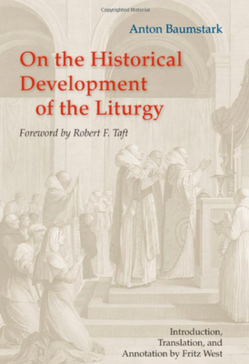
Anton Baumstark's On the Historical Development of the Liturgy (1923) complements his classic work, Comparative Liturgy. Together they lay out his liturgical methodology. Comparative Liturgy presents his method; On the Historical Development of the Liturgy offers his model.
This book was written for one audience and valued by another. Written to lead adherents of the nascent German liturgical movement to a deeper religious appreciation of Catholic worship, its methodology and scope have won the appreciation of liturgical specialists for nearly a century. In describing the organic growth of the liturgy, its shaping and distortion, Baumstark's reach extends from India to Ireland, Moscow to Axum, Carthage to Xi'an. He discusses the influences of language, literature, doctrine, piety, politics, and culture. While his audacity can be breathtaking and his hypotheses grandiose, his approach is nevertheless stimulating. In this annotated edition, Fritz West provides the first English translation of this work by Anton Baumstark.
Trained in classical and oriental philology, Anton Baumstark (1872-1948) was prodigious as a scholar studying the literature, art, and liturgy of the whole church--Oriental, Eastern, and Western. Comparative liturgy, his method for studying the historical development of the liturgy as an organism, has had a lasting influence, notably on the liturgical study of the Christian East. Fritz West, a liturgical scholar ordained in the United Church of Christ, has written numerous articles on liturgical methodology, the three-year lectionary, and worship in his Reformed tradition. He has published two books, The Comparative Liturgy of Anton Baumstark and Scripture and Memory: The Ecumenical Hermeneutic of the Three-Year Lectionaries.
The review of the proclamation of the Gospel in 2011 by the Pope is a stunning reminder that not all is complete if not rooted and grounded in Christ. His questions are good points for self-examination. Be careful to read the emphasis added to the text.
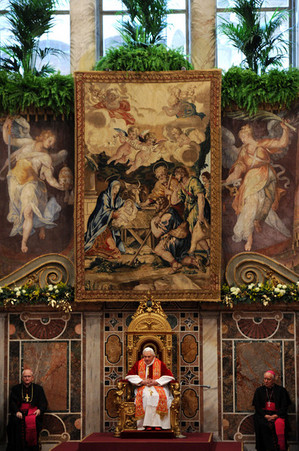
The occasion that brings us together today is always particularly moving. The holy feast of Christmas is almost upon us and it prompts the great family of the Roman Curia to come together for a gracious exchange of greetings, as we wish one another a joyful and spiritually fruitful celebration of this feast of the God who became flesh and established his dwelling in our midst (cf. Jn 1:14). For me, this is an occasion not only to offer you my personal good wishes, but also to express my gratitude and that of the Church to each one of you for your generous service; I ask you to convey this to all the co-workers of our extended family. I offer particular thanks to the Dean of the College, Cardinal Angelo Sodano, who has given voice to the sentiments of all present and of all who work in the various offices of the Curia and the Governorate, including those whose apostolate is carried out in the Pontifical Representations throughout the world. All of us are committed to spreading throughout the world the resounding message that the angels proclaimed that night in Bethlehem, "Glory to God in the highest and on earth peace to people of good will" (Lk 2:14), so as to bring joy and hope to our world.
As this year draws to a close, Europe is undergoing an economic and financial crisis, which is ultimately based on the ethical crisis looming over the Old Continent. Even if such values as solidarity, commitment to one's neighbour and responsibility towards the poor and suffering are largely uncontroversial, still the motivation is often lacking for individuals and large sectors of society to practise renunciation and make sacrifices. Perception and will do not necessarily go hand in hand. In defending personal interests, the will obscures perception, and perception thus weakened is unable to stiffen the will. In this sense, some quite fundamental questions emerge from this crisis: where is the light that is capable of illuminating our perception not merely with general ideas, but with concrete imperatives? Where is the force that draws the will upwards? These are questions that must be answered by our proclamation of the Gospel, by the new evangelization, so that message may become event, so that proclamation may lead to life.
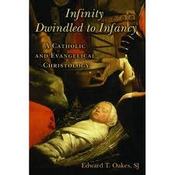 Over the summer Jesuit Father Edward Oakes published his latest book, Infinity Dwindled to Infancy.
Over the summer Jesuit Father Edward Oakes published his latest book, Infinity Dwindled to Infancy.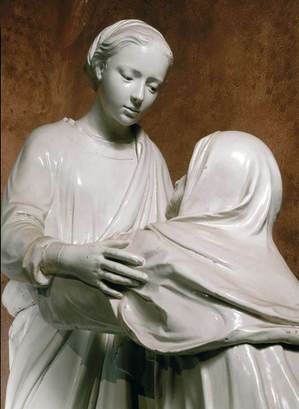 Advent is moving us closer and closer to the Incarnation of the Eternal Word of God--Jesus. Among the rich readings of sacred Scripture we have in the Liturgy, there is today's that recalls for us Mary's visiting her cousin Elizabeth who is pregnant with John the Baptist. The Visitation is the second of the Joyful Mysteries of the Holy Rosary.
Advent is moving us closer and closer to the Incarnation of the Eternal Word of God--Jesus. Among the rich readings of sacred Scripture we have in the Liturgy, there is today's that recalls for us Mary's visiting her cousin Elizabeth who is pregnant with John the Baptist. The Visitation is the second of the Joyful Mysteries of the Holy Rosary.
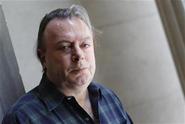 The widely known public atheist Christopher Hitchens, 62, died from complications of pneumonia and cancer of the esophagus. He was Oxford educated and the author of several books who worked as a new correspondent and literary critic.
The widely known public atheist Christopher Hitchens, 62, died from complications of pneumonia and cancer of the esophagus. He was Oxford educated and the author of several books who worked as a new correspondent and literary critic.The offers us a yearly letter for the World Day of Peace celebrated on January 1 of the new year. This year's theme is "Educating Young People in Justice and Peace." His hope is that the "conviction that the young, with their enthusiasm and idealism, can offer new hope to the world." Indeed. we need their witness and work to be agents of justice and peace today. The letter sets an important course for us in whatever we do in life. Emphasis in the text is my own.

1. THE BEGINNING OF A NEW YEAR, God's gift to humanity, prompts me to extend to all, with great confidence and affection, my heartfelt good wishes that this time now before us may be marked concretely by justice and peace.
With what attitude should we look to the New Year? We find a very beautiful image in Psalm 130. The Psalmist says that people of faith wait for the Lord "more than those who watch for the morning" (v. 6); they wait for him with fi rm hope because they know that he will bring light, mercy, salvation. This waiting was born of the experience of the Chosen People, who realized that God taught them to look at the world in its truth and not to be overwhelmed by tribulation. I invite you to look to 2012 with this attitude of confident trust. It is true that the year now ending has been marked by a rising sense of frustration at the crisis looming over society, the world of labour and the economy, a crisis whose roots are primarily cultural and anthropological. It seems as if a shadow has fallen over our time, preventing us from clearly seeing the light of day.
Silence is misunderstood by so many people today. Some friends and family think that being silent is horrible, or that it is a punishment for something. Silence may have been used as a weapon, but in reality, it is not and silence ought not be used as such, ever. The new bishop of Aberdeen (Scotland), Hugh Gilbert, delivered his first pastoral letter on the subject of silence. As a Benedictine he is attune to the contours of silence as Saint Benedict exhorts followers of his Rule for Beginners to live in an atmosphere of silence. Could what Bishop Hugh offers be of assistance to us?
We live in a noisy world. Our towns and cities are full of noise. There is noise in the skies and on the roads. There is noise in our homes, and even in our churches. And most of all there is noise in our minds and hearts.
The Danish philosopher Kierkegaard once wrote: 'The present state of the world and the whole of life is diseased. If I were a doctor and I were asked for my advice, I should reply: "Create silence! Bring people to silence!" The Word of God cannot be heard in the noisy world of today. And even if it were trumpeted forth with all the panoply of noise so that it could be heard in the midst of all the other noise, then it would no longer be the Word of God. Therefore, create silence!'
'Create silence!' There's a challenge here. Surely speaking is a good and healthy thing? Yes indeed. Surely there are bad kinds of silence? Yes again. But still Kierkegaard is on to something.
There is a simple truth at stake. There can be no real relationship with God, there can be no real meeting with God, without silence. Silence prepares for that meeting and silence follows it. An early Christian wrote, 'To someone who has experienced Christ himself, silence is more precious than anything else.' For us God has the first word, and our silence opens our hearts to hear him. Only then will our own words really be words, echoes of God's, and not just more litter on the rubbish dump of noise.
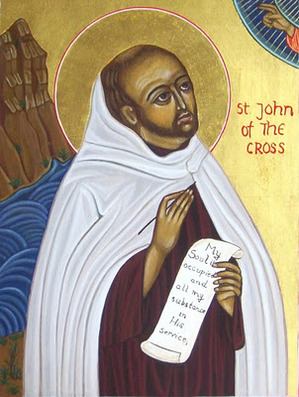
The people of Sicily and northern Europe especially remember Saint Lucy as their heavenly patron and friend. I have a particular fondness for her because Saint Lucy is an early martyr of the Church and because an aunt and uncle lived with physical blindness.
We pray at Mass with these words...
May the glorious intercession of the Virgin and Martyr Saint Lucy give heart, we pray, O Lord, so that we may celebrate her heavenly birthday in this present age and so behold things eternal.
Hermina Tharway, 12, prepares for exams at Santa Lucia, a home for blind people in Abou, Egypt (image by Holly Pickett).
The Santa Lucia Home -- named in honor of the patron saint of the blind -- was built with funds from CNEWA's donors and houses ten girls and eight boys from ages 8 to 18. The children do not attend school next door, which is not equipped to teach the blind. Rather, they are enrolled in public programs in other areas of the city. The boys attend El Nour School in Alexandria's Muharram Bey neighborhood, while the girls attend a similar school in the Zizina area.
Sister Souad and her colleague, Sister Hoda Chaker Assal, rouse the children every morning for breakfast, baths and a 7:45 date with the school bus.
"Here we wake them and prepare them for school, we feed them and do their laundry and we tuck them in at night and make sure they get a good rest," says Sister Souad. "It is just like at home."
For more from this story see, Blind to Limitations.
h/t to One to One, the blog of Catholic Near East Welfare Association
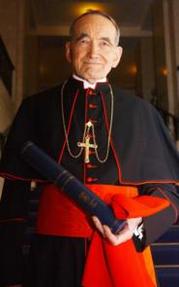 Today is the 3rd anniversary of the Jesuit Avery Robert Cardinal Dulles' entrance into life eternal. I pray for a friend's solicitude but now from a different perch.
Today is the 3rd anniversary of the Jesuit Avery Robert Cardinal Dulles' entrance into life eternal. I pray for a friend's solicitude but now from a different perch.
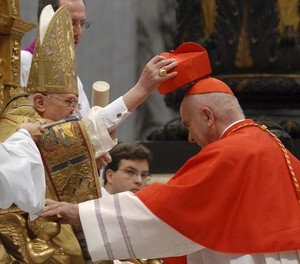 Earlier today, John Patrick Cardinal Foley, 76, died as a result of cancer.
Earlier today, John Patrick Cardinal Foley, 76, died as a result of cancer.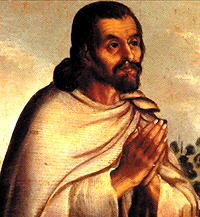 A relatively obscure saint on our liturgical calendar, as many are, but here in the USA while Saint Juan Diego (1774-1548) is not as well-known as he ought to be, those who recognize him know that he famous for being an instrument of Divine Providence. He discerned God's will and lived his life as though he really belonged to Jesus Christ. He is the first native American to be raised to the altar. As Pope John Paul said, Juan Diego shed light on the divine path to salvation. Pray and closely read the prayer used at Mass below.
A relatively obscure saint on our liturgical calendar, as many are, but here in the USA while Saint Juan Diego (1774-1548) is not as well-known as he ought to be, those who recognize him know that he famous for being an instrument of Divine Providence. He discerned God's will and lived his life as though he really belonged to Jesus Christ. He is the first native American to be raised to the altar. As Pope John Paul said, Juan Diego shed light on the divine path to salvation. Pray and closely read the prayer used at Mass below. What did we hear today from the sacred Liturgy about the Immaculate Conception of the Blessed Virgin Mary? How close to did you pay attention to the priest praying the Mass prayers on your behalf? What's the import of the feast? To know the answers we have to look at the texts of today's Liturgy. Did you notice when the priest prayed:
What did we hear today from the sacred Liturgy about the Immaculate Conception of the Blessed Virgin Mary? How close to did you pay attention to the priest praying the Mass prayers on your behalf? What's the import of the feast? To know the answers we have to look at the texts of today's Liturgy. Did you notice when the priest prayed:Of any fair-minded and competent person it is a daunting task of taking on the work of the Chief Shepherd of a very large (nearly 1.5 million Catholics) local church is enough to make one have second thoughts but imagine taking on a project that's been rocked by low morale among the faithful and clergy, numerous victims of sexual misconduct, of a troubled school and parish systems and the like. But that is what the 67 year old Capuchin Friar-Archbishop is doing in Philadelphia. Rebuilding the Lord's church as Saint Francis of Assisi was exhorted, Archbishop Charles has completed only 3 months of service in Philadelphia and he's fresh from a meeting with Pope Benedict XVI and now a letter oriented to setting a straighter path to Christ.
Consider in brief, Chaput's words:

Complacency is the enemy of faith. To whatever degree complacency and pride once had a home in our local Church, events in the coming year will burn them out. The process will be painful. But going through it is the only way to renew the witness of the Church; to clear away the debris of human failure from the beauty of God's word and to restore the joy and zeal of our Catholic discipleship.
These words may sound sobering, but they are spoken with love as a father and a brother. They are a plea to take our baptism seriously; and to renew our local Church with Christian charity, justice and zeal. As Scripture reminds us so frequently: Do not be afraid. God uses poor clay to create grandeur and beauty. He can certainly use us to renew and advance the work of the Church -- and he will.
The full text of the pastoral letter can be read here: Pastoral Letter to the Archdiocese of Philadelphia, Abp Charles Chaput December 8, 2011.pdf
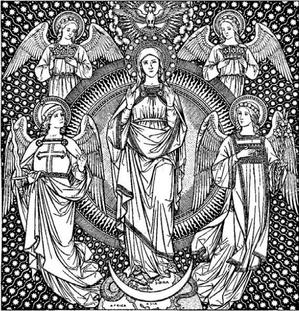 The dogma of Mary's Immaculate Conception was given to us by Pope Pius IX and proclaimed in the document, Ineffabilis Deus (1854), solemnly defining a clear and consistent teaching of the Church since 33 AD.
The dogma of Mary's Immaculate Conception was given to us by Pope Pius IX and proclaimed in the document, Ineffabilis Deus (1854), solemnly defining a clear and consistent teaching of the Church since 33 AD.We take this occasion, brethren, to communicate to you the determination, unanimously adopted by us, to place ourselves and all entrusted to our charge throughout the United States, under the special patronage of the holy Mother of God, whose Immaculate Conception is venerated by the piety of the faithful throughout the Catholic Church.By the aid of her prayers, we entertain the confident hope that we will be strengthened to perform the arduous duties of our ministry, and that you will be enabled to practice the sublime virtues, of which her life presents the most perfect example.
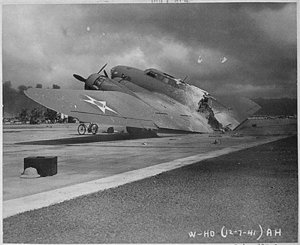 The words of FDR still ring in the ears: "a date which will live in infamy."
The words of FDR still ring in the ears: "a date which will live in infamy."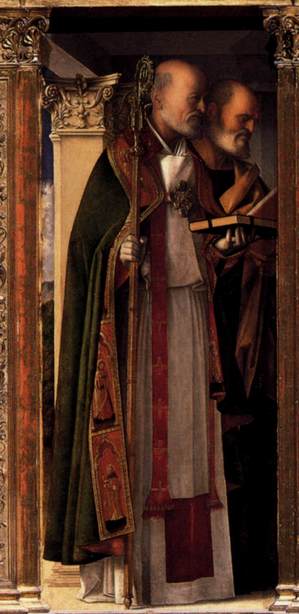 The feast of Saint Nicholas observed today is an opportunity to reflect on our reliance on others as we go onto the Lord as a community, people who have regard for another. The sainted bishop Nicholas of Myra (Turkey) reminds us of our reception of unmerited grace given by God.
The feast of Saint Nicholas observed today is an opportunity to reflect on our reliance on others as we go onto the Lord as a community, people who have regard for another. The sainted bishop Nicholas of Myra (Turkey) reminds us of our reception of unmerited grace given by God.This blog is dedicated to communion theology. What brings us a Christians--Catholics-- in communion of the Trinity, the Church and one another. The trusted witness of another gives me certitude that Faith in Jesus Christ and His the Sacrament, the Church, is real and worthy of belonging, not just following. The head of the Communion and Liberation in the USA, Chris Bacich, wrote the following letter to us today. I offer it for your reflection in these days of Advent. Emphasis given is mine.
Dear Friends,
I've been wanting to write to you for some time (since mid-November, really) about the opportunity I had to be with Fr. Carrón and a few other friends from around the world in Italy.
He invited us to a "mini-vacation" over a weekend and we spent a good amount of time speaking about the Movement and the radical nature of its proposal. In particular, Fr. Carrón wanted to hear from us what change the work on the school of community on chapters 10 and 11 of the Religious Sense and the flyer produced in Italy on the crisis had wrought in us. He pointed, in particular, to the very recent death (it had happened less than a week before we were with him) of a young man from the CLU [Communion & Liberation University Students] in Italy who had died in a motorcycle accident. He held an assembly with the university students, regarding this event, where he boldly insisted that reality is always positive. (This assembly will be featured in the next issue of Traces.) Indeed, the theme of the CLU Spiritual Exercises in Italy will be "The Inexorable Positivity of Reality." His boldness in front of such a tragic event, as well as the insistence of our charism at this time that the crisis in which the world has fallen at this moment is something positive encapsulates for me the clash of mentality that exists between us and the mentality generated by the popular culture that so often rules our hearts and minds, as well.
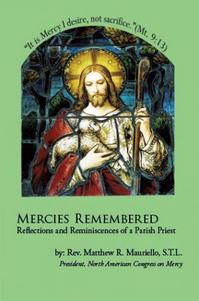 A recently published book of a parish priest, Mercies Remembered: Reflections and Reminiscences of a Parish Priest, is being presented at Waterbury's Silas Bronson Library (267 Grand Street) December 6 at 6:30pm.
A recently published book of a parish priest, Mercies Remembered: Reflections and Reminiscences of a Parish Priest, is being presented at Waterbury's Silas Bronson Library (267 Grand Street) December 6 at 6:30pm.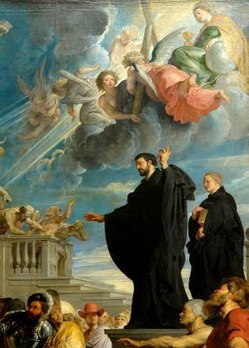 Today, we take inspiration from the life and work of a great missionary of the Church in the person of Saint Francis Xavier. He got of the classroom and did something for Christ and the Church. Let's take time today to pray for missionaries and a rejuvenation of the missionary work of the Church.
Today, we take inspiration from the life and work of a great missionary of the Church in the person of Saint Francis Xavier. He got of the classroom and did something for Christ and the Church. Let's take time today to pray for missionaries and a rejuvenation of the missionary work of the Church.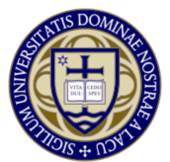 Timothy Michael Dolan, PhD, Archbishop of New York and President of the US Bishops' Conference will deliver a lecture entitled, "Modern Questions, Ancient Answers: Defining and Defending Human Dignity in Our Time" on Tuesday, December 6, @ 7:30pm inaugurating a new venture of the University of Notre Dame called "Project on Human Dignity." There will be Protestant and Catholic responses by Ann Astell and Gerald McKenny.
Timothy Michael Dolan, PhD, Archbishop of New York and President of the US Bishops' Conference will deliver a lecture entitled, "Modern Questions, Ancient Answers: Defining and Defending Human Dignity in Our Time" on Tuesday, December 6, @ 7:30pm inaugurating a new venture of the University of Notre Dame called "Project on Human Dignity." There will be Protestant and Catholic responses by Ann Astell and Gerald McKenny.From a little known text by Cardinal Joseph Ratzinger published in 1998
The pastoral approach to marriage should be founded on truth
Concerning some objections to the Church's teaching on the reception of Holy Communion by divorced and remarried members of the faithful
In 1998 Cardinal Joseph Ratzinger, Prefect of the Congregation for the Doctrine of the Faith, introduced the volume entitled "On the Pastoral Care of the Divorced and Remarried," published by the Libreria in the CDF's series ("Documenti e Studi", 17). Because of its current interest and breadth of perspective, we reproduce below the third part along with the addition of three notes. The text was published today by L'Osservatore Romano.
The Letter of the Congregation for the Doctrine of the Faith of 14 September 1994 concerning the reception of Holy Communion by divorced and remarried members of the faithful was met with a very lively response across wide sections of the Church. Along with many positive reactions, more than a few critical voices were also heard. The fundamental objections against the teaching and practice of the Church are outlined below in simplified form.
Several of the more significant objections - principally, the reference to the supposedly more flexible practice of the Church Fathers which would be the inspiration for the practice of the Eastern Churches separated from Rome, as well as the allusion to the traditional principles of epicheia and of aequitas canonica - were studied in-depth by the Congregation for the Doctrine of the Faith. Articles by Professors Pelland, Marcuzzi and Rodriguez Luño 2, among others, were developed in the course of this study. The main conclusions of the research, which suggest the direction of an answer to the objections, will be briefly summarized here.
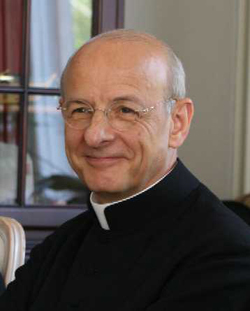
Fernando Ocáriz, 67, is the Vicar General of Opus Dei. He's a trained theologian in area of Dogmatics but he's also trained in physics. In 1986 he was appointed a consultor to the Congregation for the Doctrine of the Faith and later (1989) made a member of the Pontifical Theological Academy. Msgr. Ocáriz is the author of many books and refereed articles. He's one of the primary authors of Dominus Iesus. Of late Msgr. Ocáriz has been a theological consultant in the dialogue with the Society of St Pius X.
The following article is published in several languages by L'Osservatore Romano (2 December 2011).
On adhesion to the Second Vatican Council
The forthcoming 50th anniversary of the convocation of the Second Vatican Council (25 December 1961) is a cause for celebration, but also for renewed reflection on the reception and application of the Conciliar Documents.
Over and above the more directly practical aspects of this reception and application, both positive and negative, it seems appropriate also to recall the nature of the intellectual assent that is owed to the teachings of the Council. Although we are dealing here with a well-known doctrine, about which there is an extensive bibliography, it is nevertheless useful to review it in its essential points, given the persistence - also in public opinion - of misunderstandings regarding the continuity of some Conciliar teachings with previous teachings of the Church's Magisterium.
Generally once a year the Pope calls together all those involved in the work of each of the Pontifical councils for a plenary session, usually addressing some key item. Today was the Plenary Assembly of the Pontifical Council for the Family
I am pleased to welcome you on the occasion of the Plenary Assembly of the Pontifical Council for the Family, on the occasion of a double XXX anniversary: that of the Apostolic Exhortation Familiaris Consortio, published November 22, 1981 by Blessed John Paul II and the Congregation itself, which he established on May 9 with the Motu Proprio Familia a Deo instituta, as a sign of the importance to be attributed to family ministry in the world and at the same time, as an effective tool to help promote it at every level (cf. John Paul II, Familiaris Consortio, 73). I cordially greet Cardinal Ennio Antonelli, thanking him for the words with which he introduced our meeting, as well as the Bishop Secretary, other employees and all of you gathered here.
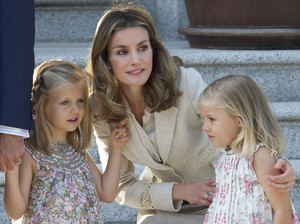
The new evangelization depends largely on the domestic Church (cf. ibid., 65). In our time, as in times past, the eclipse of God, the spread of ideologies contrary to the family and the degradation of sexual ethics are intertwined. And just as the eclipse of God and the crisis of the family are linked, so the new evangelization is inseparable from the Christian family. The family is indeed the way of the Church because it is the "human space" of our encounter with Christ. Spouses, " not only receive the love of Christ and become a saved community, but they are also called upon to communicate Christ's love to their brethren, thus becoming a saving community " (ibid., 49). The family founded on the Sacrament of Matrimony is a particular realization of the Church, saved and saving, evangelized and evangelizing community. Just like the Church, it is called to welcome, radiate and show the world the love and the presence of Christ. The reception and transmission of divine love are realized in the mutual commitment of spouses, generous and responsible procreation, in the care and education of children, work and social relationships, with attention to the needy, in participation in church activities, in commitment to civil society. The Christian Family to the extent it succeeds in living love as communion and service as a reciprocal gift open to all, through a process of ongoing conversion supported by the grace of God, reflects the splendor of Christ in the world and the beauty of the divine Trinity. Saint Augustine has a famous quote: "immo vero vides Trinitatem, si caritatem vides ", "If you see charity, yes indeed you see the Trinity " (De Trinitate, VIII, 8). And the family is one of the fundamental places where you live and are educated to love and charity.
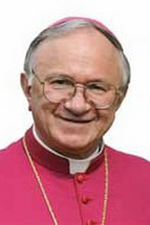
We honor with fraternal solidarity and spiritual closeness those who faithfully and sensitively observe World AIDS Day 2011. Not many have been unaffected by HIV/AIDS: we know someone directly or have been acquainted with someone who has had the devastating disease of HIV/AIDS. I've known several people who died due to complications of AIDS or know people who live with the disease today. There's 33 million people affected by the disease. How can a heart centered on the Lord be unmoved by our brothers and sisters who struggle to live with uncertainty?
Archbishop Zygmunt Zimowski, 62, the President of the Pontifical Council for Health Care Workers, wrote a letter on today's observance. He notes some good stuff; challenging stuff for some, but things we need to grapple with if we are sincere in our pursuit of truth, goodness and beauty. His thinking in other places has asked for the international community to come together and work on diseases that are pandemic in nature because it is a matter of global security and solidarity. The Archbishop's letter follows:
Pontifical Council for Health Care Workers
on the Occasion of the World AIDS Day 2011
The World AIDS Day of 2011 must constitute a new opportunity to promote universal access to therapies for those who are infected, the prevention of transmission from mother child, and education in lifestyles that involve, as well, an approach that is truly correct and responsible as regards sexuality. In addition, this is a privileged moment to relaunch the fight against social prejudice and to reaffirm the need for moral, spiritual and - as far as this is possible - material proximity to those who have contracted the infection and to their family relatives.
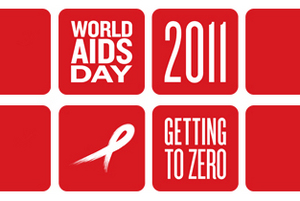
Today's known as World AIDS Day. The focus of the day is "an opportunity for people worldwide to unite in the fight against HIV, show their support for people living with HIV and to commemorate people who have died. World AIDS Day was the first ever global health day and the first one was held in 1988." This dreadful disease has claimed many millions of people world-wide --and sex is not always to blame. AND condom use is the answer.
With all the advances in medicine, there are still gaping holes in education and prevention in the fields of medicine, pharmacology, spirituality and society. The recent trip of Pope Benedict to Benin highlighted yet again the need before us. Specifically Benedict called for a holistic response to the AIDS pandemic.
Pope Benedict stated:
The problem of AIDS,in particular,clearly calls for a medical and pharmaceutical response. This is not enough, however: the problem goes deeper. Above all, it is an ethical problem. The change of behavior that it requires -for example, sexual abstinence, rejection of sexual promiscuity, fidelity within marriage- ultimately involves the question of integral development,which demands a global approach and a global response from the Church. For if it is to be effective, the prevention of AIDS must be based on a sex education that is itself grounded in an anthropology anchored in the natural law and enlightened by the word of God and the Church's teaching.
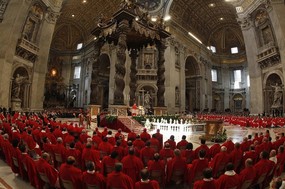
"In our prayer also, we must learn increasingly to enter into this history of salvation whose summit is Jesus; [we must learn] to renew before God our personal decision to open ourselves to His Will, and to ask Him for the strength to conform our will to His -- in every aspect of our lives -- in obedience to His plan of love for us" (Benedict XVI, November 30, 2011)
The general intention
That all peoples may grow in harmony and peace through mutual understanding and respect.
The missionary intention
That children and young people may be messengers of the Gospel and that they may be respected and preserved from all violence and exploitation.
